Shedding light on female desire at all ages
In books and films, a new generation of women is speaking openly about the taboos surrounding happy relationships and sex
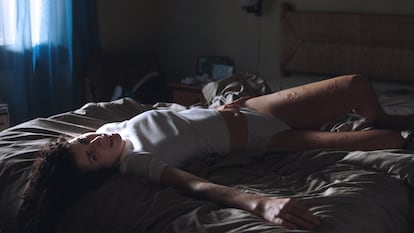
When Elena Martín Gimeno and Clara Roquet began writing Creatura [Creature], which debuted at the last Cannes Film Festival’s Directors’ Fortnight, they looked into how cinema has treated female sexual awakenings in adolescence and childhood. “There were many examples of adolescent sexuality, but most of them portrayed it as if it were something intrinsically dangerous, as if female desire were something dark in and of itself. We wanted to talk about the exact opposite and the repression it causes,” explains Gimeno, who directed the film. Creatura addresses the taboo of child sexuality in a way that is as natural as it is brave. But the filmmakers only found one model that deals with the subject, Alicia Duffy’s 2002 short film The Most Beautiful Man in the World, which Martín points out, takes a “very subtle” approach to a girl’s desire. On a very hot summer afternoon, a young girl who is bored at home goes for a walk with her dog. Under a golden sun, the girl curiously discovers a man with a naked torso. Both look at each other and smile in silence. The mother, who watches them from a distance, interrupts the brief encounter and the girl runs away. That’s it.
“I think the main way Creatura makes us uncomfortable is in our social and cultural background,” Martin adds. “When you present an adult woman with problems with sex everyone tends to think of abuse and that tension is there all the time. We all have fears; it’s not a question of being naïve, we have lived through abusive situations. But desire is not bad; it has a powerful and healing energy that’s linked with happiness. How many movies have shown us female masturbation as something dangerous or macabre? But is there anything less dangerous than masturbating?”
The gestation of Creatura—which will be released in Spain on September 8 and won the award for Best European Film at the Directors’ Fortnight—is also connected to the performative group Pussy Picnic, which works with issues of female identity, and to Venus: Naked Confessions (Filmin), a 2017 Danish documentary in which directors Lea Glob and Mette Carla Albrechtsen filmed over a hundred women talking about their sexual fantasies and frustrations. “It brought tears to my eyes,” Martin recalls.
Lea Glob and Mette Carla Albrechtsen wanted to shoot an erotic film for women, so they wondered about the disconnect between their eroticism and their personas. The two friends show themselves naked while also questioning their attraction to the darker side of sex, “that fine line between pleasure and destruction, or sadness, if you let the wrong person get too close,” they say. To better understand themselves, they summoned women in their thirties to talk on camera about their feelings and experiences.
Joyful menopause
Writer and cultural producer María Acaso’s book Y a lo mejor contarlo [Better to tell the tale] (Paidós), explores eros during menopause. The main character is a woman who is “guided by the readings of different feminist theorists,” from Virginie Despentes to Betty Friedan and Sara Ahmed to Brigitte Vasallo, and she decides to open up to a “transgressive sexuality,” which includes group sex and paid sex work to achieve what Acaso describes as “joyful menopause.” For the author, Gillian Anderson’s character in the show Sex Education is a role model for mature female sexuality. “Sex is a tool for conquering eros and freedom, which is the important thing,” says Acaso.
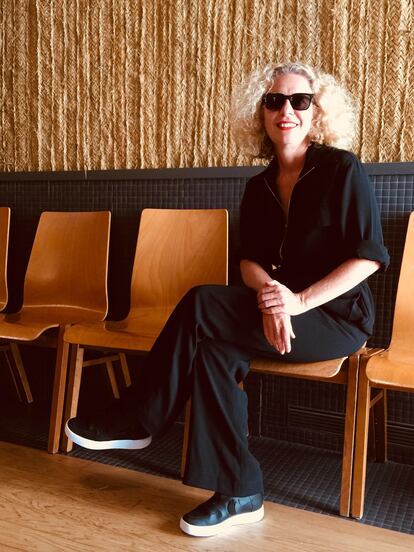
The author explains that her “book goes through shame and embraces new affective models like relational anarchy. Women are sexually active subjects, and we have to stop thinking that our sexuality declines at 50. We have more security and resources, as well as [many] years of feminism and self-knowledge. For me, pleasure is something political…the concept of eros not only has to do with sex, but also with swimming in the sea, eating what you like, [enjoying] your favorite music or aesthetic experience. And [doing] that without giving up my adult responsibilities, my daughters and my job. In short, enjoying [myself] instead of taking a diazepam.”
In an almost opposite conception of these new explorations of mature women’s desire, two dramatic films set to premiere in the fall both show feminine power’s murkier side. One is the French L’été dernier (Last Summer)—a remake of the excellent Danish film Queen of Hearts—directed by Catherine Breillat, who is controversial for defending producer Harvey Weinstein and criticizing the Me Too movement. The film chronicles the stormy idyll between an older, powerful woman and her husband’s teenage son. In the second movie, May December, American director Todd Haynes, a master of contemporary melodrama, tells a very complex story (based on real events) about a 36-year-old woman (played by Julianne Moore) who had an affair with a 12-year-old boy and ended up in jail.
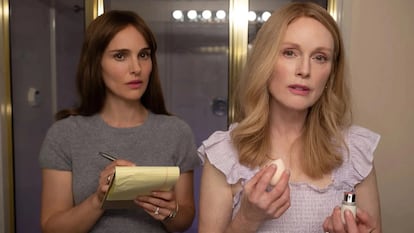
A new story
Barcelona-born journalist Adaia Teruel, 45, set out to write Mujeres que follan [Women Who Fuck] (Libros del K.O.) to break the silence and taboos around female sexuality by telling the real story of women and sex. The recently published book compiles real testimonies from some thirty women who tell how they have experienced sex throughout their lives, what they like, what they don’t like, their fears, their fantasies, how they lost their virginity, what turns them on. “We just can’t continue to assume or to have sex the way we’ve been told [to] for centuries. One of the things I’ve realized in writing this book is the desire we have as women to finally talk about these things without being shy about it. When I started the interviews, I thought it would be hard for me to find participants, but it has been just the opposite: they came to me. That’s because we have always been silenced, we don’t even dare to open up to our friends. We are ashamed of everything, whether we enjoy it or not. We think we’re guilty of something, or [that we’re] weirdos if we don’t like what we’re supposed to like. And it’s only when we’ve started telling each other [about it] that we’ve realized that we’re not freaks because we have certain fantasies or because we like sex this way or that way. That’s why it’s important to talk: to take ownership of the story,” the author reflects.
The women in Teruel’s book are all in their forties, which, along with the explicit title, may convey the wrong idea about the content. The author explains that she “chose that age bracket because it is [the one I belong to], but my goal in this project is not to vindicate sex at an older age, but rather to talk about how sex is interrelated with life. Because talking about sex means talking about emotional education, social class, the pressure to have a beautiful body, the myth of romantic love, feminism and patriarchy.”
Mujeres que follan is not an erotic book for women, nor is it a psychological or practical study of female sexuality. “There is a lot of that [already] on the market. But I needed to know what really happens with women in bed. I wrote the book that I wanted to read myself,” the author says. The truth is that the publishing market is full of more or less “racy” literature for women, ranging from chick lit to more explicit stories, but “that has more to do with fantasy—sometimes more men’s fantasy than women’s—than reality. And it can even be detrimental. For example, let’s think about 50 Shades of Grey: after so much messing around with the whip and flouting convention, in the end the girl marries in a white dress and lives happily ever after. The usual story is perpetuated this way! Romantic love, marriage as the ultimate goal, patriarchy... And the worst thing is that it continues to be perpetuated: just look at the Twilight series for teenagers. That’s not the way we move forward,” Teruel says.
Women Who Fuck has very little precedent. In 1993, American Nancy Friday collected testimonials from more than 150 women who uninhibitedly confessed to her their most secret sexual fantasies in My Secret Garden. More recently, her compatriot Lisa Taddeo burst onto the scene in 2019 with Three Women, a work of great literary journalism that she wrote after following the lives of three strangers for eight years and exploring how sexual desire shaped their lives. “I’m interested in these subjects because we’re not honest in talking about them. The most important things in life are sex and death, and we lie about both,” Taddeo said in an interview with EL PAÍS in 2020. Recently, authors like Lillian Fishman, Raven Leilani and Lynne Tillman have also questioned and overturned many prejudices in their fiction.
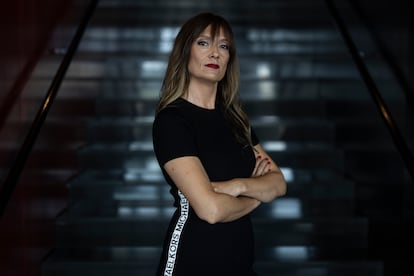
Digging into these books, it is striking how many taboos women bear. The feminist movement started a long time ago, but it appears to have forgotten about sex. It has fought for the contraceptive pill, condoms and abortion, but sexuality seems to be a battle that each woman must face privately on her own. “Morality still weighs heavily,” Teruel reminds us. And ideology? “Of course. And it’s scary to think about the rise of certain types of conservative extremism. It’s incredible how some influencers are succeeding [by] touting the model of a woman who aspires to be a good wife and mother,” she warns.
A survey of the history of literature and film reveals that female desire has traditionally been told and shaped by men. That is why the narrative that is now emerging from the perspective of women is of interest to men as well as women. “This is good for [men] too. Since I published my book, many men have told me that they want to read it to know how things are really experienced from the other side, what we feel, what we like,” says Teruel. Elena Martín concurs: “It’s funny; many men have approached us after seeing the film, and I think it’s because they were afraid of their role, but in the end they feel recognized, their fears are also there, and they see themselves tenderly. They are men who want to do the right thing, but they don’t know how because they are a little lost. We always wanted to understand all the angles.”
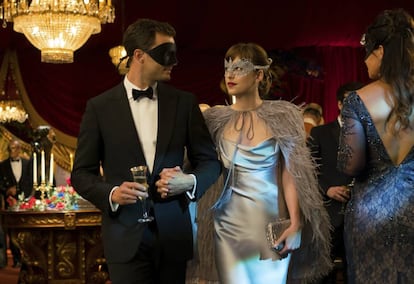
Sign up for our weekly newsletter to get more English-language news coverage from EL PAÍS USA Edition
Tu suscripción se está usando en otro dispositivo
¿Quieres añadir otro usuario a tu suscripción?
Si continúas leyendo en este dispositivo, no se podrá leer en el otro.
FlechaTu suscripción se está usando en otro dispositivo y solo puedes acceder a EL PAÍS desde un dispositivo a la vez.
Si quieres compartir tu cuenta, cambia tu suscripción a la modalidad Premium, así podrás añadir otro usuario. Cada uno accederá con su propia cuenta de email, lo que os permitirá personalizar vuestra experiencia en EL PAÍS.
¿Tienes una suscripción de empresa? Accede aquí para contratar más cuentas.
En el caso de no saber quién está usando tu cuenta, te recomendamos cambiar tu contraseña aquí.
Si decides continuar compartiendo tu cuenta, este mensaje se mostrará en tu dispositivo y en el de la otra persona que está usando tu cuenta de forma indefinida, afectando a tu experiencia de lectura. Puedes consultar aquí los términos y condiciones de la suscripción digital.








































